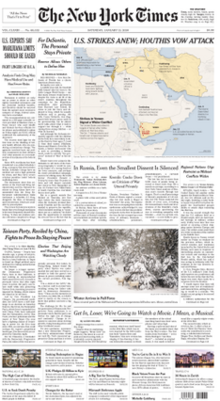
Back The New York Times Afrikaans The New York Times ALS The New York Times AN The New York Times ANG نيويورك تايمز Arabic نيو يورك تايمز ARZ The New York Times AST The New York Times Azerbaijani نیویورک تایمز AZB New York Times BAR
| All the News That's Fit to Print | |
 The New York Times print edition on January 13, 2024 | |
| Type | Daily newspaper |
|---|---|
| Format | Broadsheet |
| Owner(s) | The New York Times Company |
| Founder(s) | |
| Publisher | A. G. Sulzberger |
| Editor-in-chief | Joseph Kahn |
| Managing editor | |
| Staff writers | 1,700 (2023) |
| Founded | September 18, 1851 |
| Headquarters | 620 Eighth Avenue New York City, 10018, U.S. |
| Circulation | 10,800,000 news subscribers[a] (as of May 2024) |
| Sister newspapers | International Herald Tribune (1967–2013) The New York Times International Edition (1943–1967; 2013–present) |
| ISSN | 0362-4331 (print) 1553-8095 (web) |
| OCLC number | 1645522 |
| Website | nytimes |
| This article is part of a series about |
| The New York Times |
|---|
| Publications |
| People |
| The New York Times Company |
The New York Times (NYT)[b] is an American daily newspaper based in New York City. The New York Times covers domestic, national, and international news, and publishes opinion pieces, investigative reports, and reviews. As one of the longest-running newspapers in the United States, the Times serves as one of the country's newspapers of record. As of 2023[update], The New York Times is the second-largest newspaper by print circulation in the United States, with 296,330 print subscribers. The Times has 8.83 million online subscribers, the most of any newspaper in the United States. The New York Times is published by The New York Times Company; since 1896, the company has been chaired by the Ochs-Sulzberger family, whose current chairman and the paper's publisher is A. G. Sulzberger. The Times is headquartered at The New York Times Building in Midtown Manhattan.
The Times was founded as the conservative New-York Daily Times in 1851, and came to national recognition in the 1870s with its aggressive coverage of corrupt politician William M. Tweed. Following the Panic of 1893, Chattanooga Times publisher Adolph Ochs gained a controlling interest in the company. In 1935, Ochs was succeeded by his son-in-law, Arthur Hays Sulzberger, who began a push into European news. Sulzberger's son-in-law Arthur Ochs became publisher in 1963, adapting to a changing newspaper industry and introducing radical changes. The New York Times was involved in the landmark 1964 U.S. Supreme Court case New York Times Co. v. Sullivan, which restricted the ability of public officials to sue the media for defamation.
In 1971, The New York Times published the Pentagon Papers, an internal Department of Defense document detailing the United States's historical involvement in the Vietnam War, despite pushback from then-president Richard Nixon. In the landmark decision New York Times Co. v. United States (1971), the Supreme Court ruled that the First Amendment guaranteed the right to publish the Pentagon Papers. In the 1980s, the Times began a two-decade progression to digital technology and launched nytimes.com in 1996. In the 21st century, The New York Times has shifted its publication online amid the global decline of newspapers.
The Times has expanded to several other publications, including The New York Times Magazine, The New York Times International Edition, and The New York Times Book Review. In addition, the paper has produced several television series, podcasts — including The Daily — and games through The New York Times Games. The New York Times has been involved in several controversies in its history. The Times maintains several regional bureaus staffed with journalists across six continents, and has received 137 Pulitzer Prizes as of 2023, the most of any publication, among other accolades.
Cite error: There are <ref group=lower-alpha> tags or {{efn}} templates on this page, but the references will not show without a {{reflist|group=lower-alpha}} template or {{notelist}} template (see the help page).